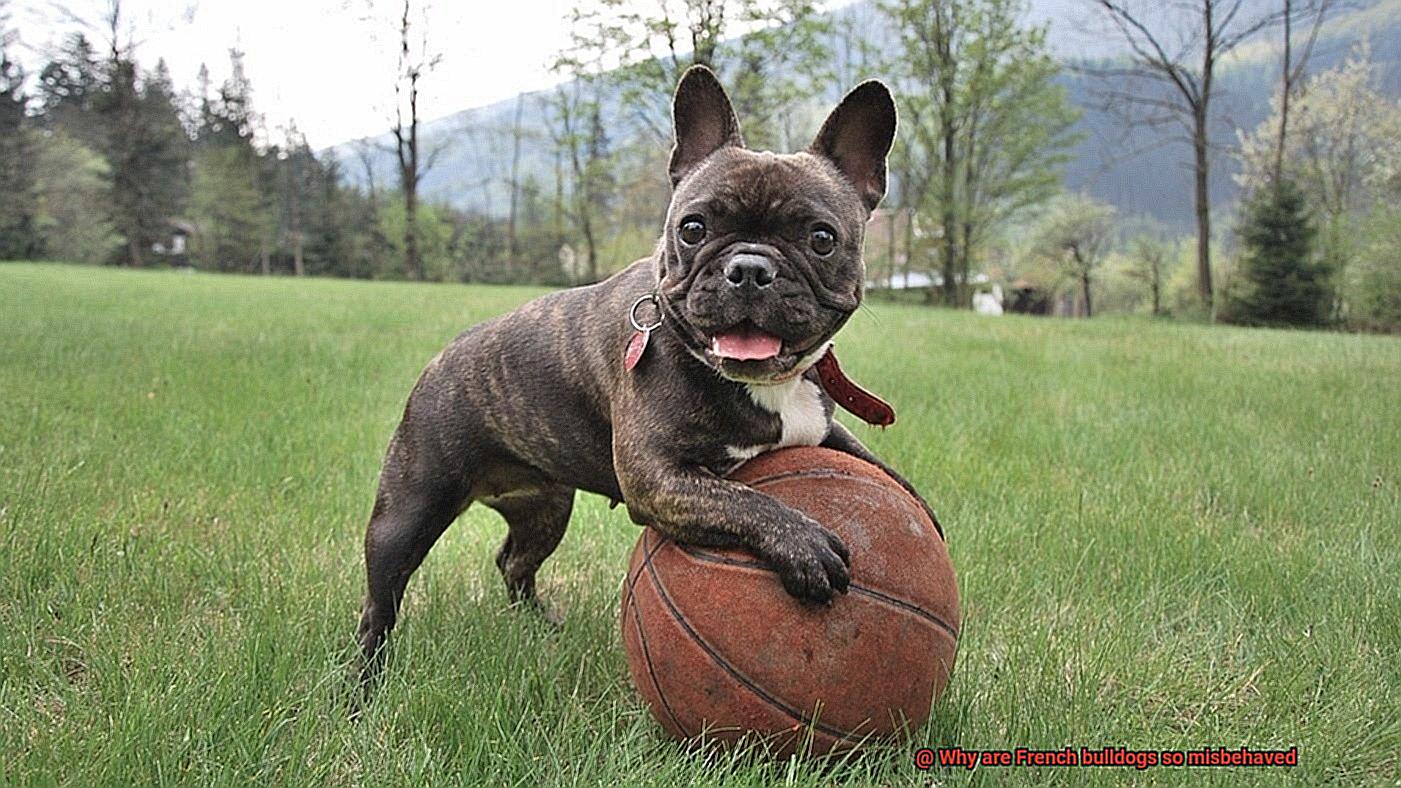Why are French bulldogs so misbehaved?
French Bulldogs, with their adorable bat-like ears and irresistible charm, have captured the hearts of a dedicated fanbase. But amidst the love and adoration, there’s a notorious reputation that precedes these lovable bundles of joy: their mischievous and sometimes downright naughty behavior.
So, what’s the deal with French Bulldogs? Are they simply born troublemakers or is there more to their misbehavior?
In this blog post, we’ll take a deep dive into the whimsical world of French Bulldogs, uncovering the reasons behind their infamous reputation and exploring effective strategies to keep their shenanigans in check.
Get ready for an enlightening journey into the playful minds of French Bulldogs.
French Bulldog’s Independent Personality
Contents
- 1 French Bulldog’s Independent Personality
- 2 High Energy Levels
- 3 Separation Anxiety
- 4 Sensitive Digestive System
- 5 Breeding History
- 6 Establishing Yourself as the Pack Leader
- 7 Consistent and Firm Training from an Early Age
- 8 Providing Adequate Exercise and Mental Stimulation
- 9 Gradual Acclimation to Being Alone and Appropriate Diet
- 10 Conclusion
French Bulldogs are renowned for their distinctive personalities, but their independent nature can sometimes lead to mischievous behavior. In this article, we will delve into the reasons behind their misbehavior and provide invaluable strategies for managing and preventing such occurrences.

The Stubborn Streak:
French Bulldogs are famous for their stubbornness, making training a challenge. Establishing consistent rules and boundaries from an early age is crucial in curbing misbehavior. Employing positive reinforcement techniques, such as rewards and praise, effectively motivates these independent canines.
Prey Drive and Destructive Behaviors:
French Bulldogs possess a strong prey drive, rendering them easily distracted by small animals or objects. This inclination can lead to chasing or engaging in destructive behaviors. Proper training and socialization play a pivotal role in managing their prey drive, alongside providing stimulating toys and activities to channel their energy.
High Energy Levels:
Contrary to their size, French Bulldogs have high energy levels and require regular exercise to combat boredom and potential misbehavior. Daily walks, playtime, and mental stimulation through puzzle toys or training sessions keep them physically and mentally engaged.

Adventurous Nature:
French Bulldogs are naturally curious and relish exploring their surroundings. Without sufficient supervision or containment, they may wander off or engage in mischievous behaviors such as digging or escaping. Employing secure fencing and closely monitoring outdoor activities are essential for averting these incidents.
Separation Anxiety:
French Bulldogs forge profound bonds with their owners and may experience separation anxiety when left alone for extended periods. This anxiety often manifests as destructive behavior or excessive barking. Gradually acclimating them to alone time and providing comfort through toys or treats can help alleviate separation anxiety.
High Energy Levels
We delve into the reasons behind their high energy levels and provide effective strategies to manage their mischievous tendencies.
Genetic Predisposition:
French bulldogs belong to the brachycephalic breed group, known for their unique anatomy of flat faces and short noses. This adorable feature, however, can cause breathing difficulties during strenuous physical activities. As a result, these energetic pooches find alternative ways to release their energy, such as playfulness and jumping around.
Metabolic Rate:
Despite their small stature, French bulldogs possess a higher metabolic rate compared to larger breeds. This means they have more energy to spare and need ample outlets to expend it. Failure to meet their energy needs can lead to restlessness and behavioral issues.
Exercise is Key:
Regular exercise is crucial for French bulldogs to maintain a healthy energy balance. Engaging them in activities such as daily walks, interactive play sessions, and obedience training not only burn off excess energy but also provide mental stimulation. By keeping them physically active, you’ll keep their mischievous side at bay.
Mental Stimulation Matters:
French bulldogs are intelligent creatures that thrive on mental challenges. Incorporate puzzle toys, obedience training exercises, and problem-solving games into their routine to channel their energy in a constructive manner. A stimulated mind prevents boredom-induced misbehavior and enhances their overall well-being.
Separation Anxiety
The answer may lie in a common issue known as separation anxiety. In this comprehensive guide, we will delve into the causes and impacts of separation anxiety in French bulldogs, and provide practical tips on managing their behavior. So, let’s embark on a journey to unravel the secrets behind our beloved Frenchie’s anxieties.
Definition of Separation Anxiety:

Separation anxiety refers to the excessive distress and anxiety experienced by French bulldogs when they are separated from their owners or left alone. Given their affectionate nature, Frenchies are particularly susceptible to developing separation anxiety.
Symptoms of Separation Anxiety:
When afflicted by separation anxiety, our furry friends may exhibit a range of symptoms. These can include melodious barking or howling (oh la la.), destructive chewing (farewell, favorite slippers.), indoor accidents (merci beaucoup for the mess), restless pacing (they’re on a mission.), and ingenious attempts to escape from the house (Houdini would be proud.).
Causes of Separation Anxiety:
Understanding the root causes is crucial in effectively addressing separation anxiety. Factors such as past abandonment or rehoming, insufficient socialization during puppyhood, sudden disruptions to routine or environment, and an over-dependence on human interaction without fostering independence can all contribute to our Frenchies’ anxieties.
Impact on Misbehavior:
Separation anxiety often leads to misbehavior in French bulldogs. Excessive barking and destructive chewing may serve as coping mechanisms or attention-seeking behaviors. While these misbehaviors can be frustrating for owners, it is essential to address them promptly to prevent further problems.
Management and Solutions:
Now, let us explore pawsome strategies for managing separation anxiety. Gradual desensitization to being alone, providing mental stimulation through interactive toys, ensuring regular exercise and playtime, creating a secure and cozy environment, and seeking professional assistance if needed are all effective approaches.
Conclusion:
By comprehending the causes and effects of separation anxiety in French bulldogs, we can better support our beloved companions and foster a harmonious bond. Remember, patience, consistency, and positive reinforcement are the keys to conquering separation anxiety. Let us join forces to tame our mischievous Frenchies and relish a joyful and well-behaved companionship.

Sensitive Digestive System
French Bulldogs are undoubtedly charming with their distinctive appearance and playful nature. However, their sensitive digestive systems can occasionally lead to unexpected behavioral issues. In this article, we will explore the reasons behind this phenomenon and offer valuable advice for French Bulldog owners.
Anatomical Factors:
- The compact and brachycephalic structure of French Bulldogs can result in challenges with eating and drinking, causing them to swallow air during meals.
- Excessive air intake can lead to bloating, gas, and discomfort, resulting in restlessness, irritability, and even aggression.
Food Allergies and Sensitivities:
- French Bulldogs are prone to food allergies and sensitivities, particularly towards common ingredients found in commercial dog food.
- Grains, fillers, and artificial additives can trigger digestive reactions, such as diarrhea, vomiting, and abdominal pain.
- These discomforts can make French Bulldogs feel agitated or anxious, contributing to misbehavior.
Gastrointestinal Infections and Inflammations:
- The delicate digestive system of French Bulldogs makes them more susceptible to infections and inflammations.
- Bacterial or viral infections, as well as parasites like worms, can disrupt their fragile digestive balance.
- Inflammatory conditions like gastritis or pancreatitis can cause pain and discomfort, leading to behavioral changes like irritability or aggression.
Helpful Tips for Managing Misbehavior:
Dietary Adjustments:
- Choose a high-quality diet specifically formulated for sensitive stomachs.
- Opt for dog food that is free from common allergens like grains or artificial additives.
- Select easily digestible proteins and limited ingredient formulas.
Regular Feeding Schedule:
- Divide meals into smaller, more frequent portions to prevent overeating.
- Utilize slow feeders or puzzle toys to slow down eating pace and minimize excessive air intake.
Hydration and Exercise:
- Ensure access to clean and fresh water at all times for proper hydration.
- Regular exercise helps stimulate bowel movements and prevents constipation.
Consult a Veterinarian:
- If behavioral issues persist despite dietary adjustments, seek professional advice.
- A veterinarian can conduct further investigations and provide appropriate treatment options for underlying gastrointestinal conditions.
Breeding History
The breeding history of French Bulldogs is a captivating tale that sheds light on their occasional misbehavior. To comprehend their behavior, it is essential to delve into their origins and the selective breeding practices that have molded their characteristics.

French Bulldogs can trace their lineage back to English Bulldogs, which were popular in England during the 1800s for bull-baiting and other savage sports. However, as these activities became illegal, breeders shifted their focus to developing smaller companion dogs with a milder temperament.
During the Industrial Revolution, English lace workers emigrated to France, bringing their beloved bulldogs along. The French were enraptured by these lovable canines, igniting the birth of the French Bulldog breed.
Selective breeding was then employed to refine the breed’s traits. Breeders aimed to create a smaller dog with distinctive bat-like ears, a compact body, and a friendly nature. However, the limited gene pool resulted in unintended consequences.
Inbreeding was prevalent in the early days of French Bulldog breeding due to the scarcity of breeding stock. This unintentional practice led to reduced genetic diversity within the breed. Genetic diversity is vital for overall health and well-being as it helps prevent the expression of detrimental traits.
In addition to reduced genetic diversity, inbreeding can also increase the likelihood of health issues and behavioral problems in French Bulldogs. They are prone to brachycephalic syndrome, characterized by breathing difficulties due to their short noses and compressed airways. This syndrome can lead to snoring, wheezing, and increased susceptibility to heat stroke.
Furthermore, Frenchies are susceptible to allergies, skin disorders, and joint problems. These health issues can contribute to behavioral problems as they may cause discomfort or irritability in the dogs. For instance, a French Bulldog with itchy skin may display excessive scratching or biting, which can be mistaken for misbehavior.
Moreover, selective breeding for physical traits such as a stocky build and a flat face has also influenced French Bulldogs’ behavior. They are known for their stubborn streak, often displaying disobedience or a refusal to follow commands. This stubbornness is a direct result of their breeding history and the preservation of specific genetic traits.
Understanding the underlying factors of French Bulldog behavior is crucial for owners dealing with misbehavior. By recognizing the breed’s unique breeding history and potential health issues, owners can take appropriate steps to address behavioral problems with compassion and effectiveness.
Establishing Yourself as the Pack Leader
Look no further. In this blog post, we’ll dive into the fascinating realm of French bulldog psychology and explore practical tips and techniques to establish yourself as the pack leader. Let’s embark on this journey together.
Consistency is Key:
To gain your Frenchie’s respect, consistency is your secret weapon. Set clear rules and boundaries from day one, and stick to them like glue. Whether it’s curbing furniture jumping, table begging, or excessive barking, consistency breeds success.
Structure and Routine:
Create a structured routine to provide your Frenchie with security and stability. Set regular feeding times, exercise routines, and training sessions. This establishes their place in the pack and reinforces your leadership role.
Control the Resources:
To be the alpha, you must control all the good stuff in your Frenchie’s life. Be the gatekeeper of food, toys, and attention. By doing so, your Frenchie sees you as the provider and respects your authority.
Exercise Both Body and Mind:
A well-behaved Frenchie is a tired Frenchie. Ensure they get ample physical exercise through walks, playtime, and other activities. Mental stimulation is equally important, so engage them with puzzle toys or training sessions to keep their minds sharp.
Positive Reinforcement:
Unlock the potential of reward-based training methods when establishing yourself as the pack leader. Praise and reward your Frenchie for good behavior, redirect unwanted actions, and ignore undesirable behaviors. This positive approach nurtures an unbreakable bond between you and your furry friend.
Consistent and Firm Training from an Early Age
Consistent and firm training from an early age is the key to having a well-behaved French bulldog. This article explores the various benefits of this approach and provides valuable tips for successful training.
Set the foundation for good behavior:
Starting training as early as 8 to 12 weeks old lays the foundation for a lifetime of good behavior. Just like humans, dogs need guidance and structure to thrive. By introducing training at a young age, you establish expectations and teach your French bulldog how to behave appropriately.
Positive reinforcement techniques:
French bulldogs respond well to positive reinforcement techniques, such as treats, praise, and rewards. By using these methods, you can reward good behavior and encourage your pooch to repeat it. This creates a strong bond between you and your dog, making training sessions enjoyable for both of you.
Establish clear rules and boundaries:
Setting clear rules and boundaries is essential for French bulldogs to understand what is expected of them. Consistently enforcing these rules helps reduce confusion and ensures that your dog knows their limits. For example, teaching them not to jump on people or bark excessively reinforces proper behavior in social situations.
Patience and persistence:
Frenchies are intelligent but can be stubborn at times. Patience and persistence are key when training them. It’s important not to become frustrated or give up easily. Remember that Rome wasn’t built in a day, and consistent training efforts will yield positive results over time.
Teach basic commands for safety and convenience:
Regular and structured training sessions should focus on teaching basic commands like sit, stay, come, and leash walking. These commands ensure your Frenchie’s safety in different environments and make your life easier too. For instance, a well-trained dog that responds to commands promptly can be easily controlled during walks or visits to the vet.
Socialization is crucial:
Socializing your French bulldog from an early age is vital for their development and behavior. Exposing them to various dogs and people helps them learn appropriate behavior in different situations. This reduces the risk of aggression, fear, or anxiety later in life. Enrolling in puppy socialization classes or arranging playdates with other well-behaved dogs are excellent ways to achieve this.
Consistency is key:
Consistency is crucial in training your French bulldog effectively. Use the same methods and routines to reinforce desired behaviors consistently. This eliminates confusion and establishes a clear understanding of what is expected from your furry friend.
Seek professional help if needed:
If you’re unsure about how to train your French bulldog effectively, don’t hesitate to seek professional help. Hiring a professional dog trainer or enrolling in obedience classes can provide valuable guidance and support. They have the expertise to address specific challenges and tailor training methods to your dog’s individual needs.
Providing Adequate Exercise and Mental Stimulation
French Bulldogs are beloved for their adorable appearance, affectionate nature, and unique personalities. However, like any breed, they can exhibit misbehavior if their physical and mental needs are not adequately met. In this blog post, we will delve into the importance of providing adequate exercise and mental stimulation for French Bulldogs, exploring how these factors contribute to preventing misbehavior.
The High Energy Levels of French Bulldogs:
French Bulldogs are known for their high energy levels, which require regular exercise to keep them physically and mentally healthy. Without sufficient exercise, they may become bored and frustrated, leading to destructive behaviors.
Physical Exercise: A Key Component:
- Recommended Exercise Duration: It is crucial to provide at least 30 minutes to an hour of exercise for French Bulldogs every day.
- Types of Exercise: Incorporate activities such as walks, backyard playtime, and interactive games like puzzle toys or agility training. These activities help release pent-up energy and stimulate their minds.
Mental Stimulation: Nurturing the Mind:
- Training Sessions: Engaging in regular training sessions with your French Bulldog not only teaches them obedience but also keeps their minds stimulated and focused.
- Interactive Games and Toys: Provide a variety of toys that challenge their problem-solving skills, such as treat-dispensing toys or hide-and-seek games.
Tailor-Made Approach:
Each French Bulldog has unique exercise needs based on factors like age, health condition, and individual preferences. Consulting with a veterinarian or professional dog trainer can help determine the appropriate level of exercise and mental stimulation for your specific Frenchie.
Gradual Acclimation to Being Alone and Appropriate Diet
I have a treasure trove of valuable tips to share with you. By gradually acclimating your French bulldog to solitude and providing them with an appropriate diet, you can successfully nip those naughty behaviors in the bud and foster a happier, better-behaved pup.
Let’s embark on our journey to gradual acclimation to being alone. Renowned for their susceptibility to separation anxiety, French bulldogs often exhibit misbehavior during extended periods of solitude. The key here is to take it slow and steady.
Commence by leaving your Frenchie alone for brief intervals and gradually extend the duration as they grow more at ease. This approach builds their confidence and diminishes anxiety levels. It is paramount to construct a safe and snug sanctuary for them, complete with their bed or crate, accompanied by a selection of toys or interactive puzzles to keep them engrossed. To provide comfort and familiarity, consider leaving behind an article of clothing imbued with your scent.
Now let’s delve into the realm of diet. What your Frenchie consumes significantly influences their demeanor and overall well-being. These endearing pups are prone to food allergies and sensitivities, which can contribute to behavioral issues.
Opting for top-notch dog food specifically tailored for French bulldogs is imperative, avoiding prevalent allergens like wheat, corn, soy, and artificial additives. Seek out limited ingredient alternatives that supply lean proteins, healthy fats, and complex carbohydrates to optimize brain function and maintain stable energy levels.
Remember not to overindulge your Frenchie, as obesity can pave the way for health complications and behavioral troubles. Adhere to recommended portion sizes and adhere to scheduled meal times.
Em5WE9QFfa0″ >
Conclusion
French bulldogs are often known for their mischievous behavior, but understanding the reasons behind it can help us address these issues effectively.
One possible explanation is their strong-willed nature, which can lead to stubbornness and defiance. Additionally, their high energy levels and intelligence require ample mental and physical stimulation to prevent boredom-induced mischief.
It is crucial for owners to establish clear boundaries, provide consistent discipline, and engage in positive reinforcement techniques.




